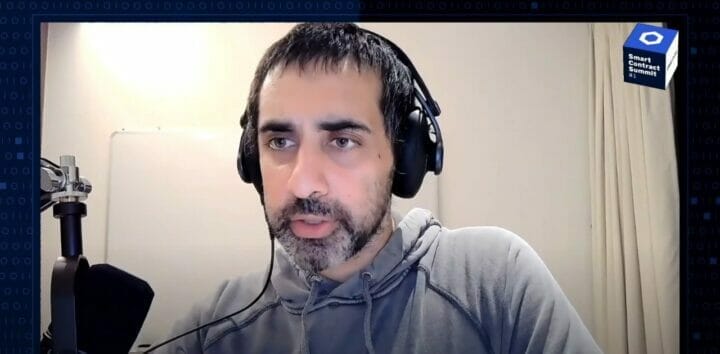“Our information supply chain is broken.”
During a riveting keynote speech on the first day of SmartCon #1, angel investor and former CTO of Coinbase Balaji Srinivasan presented the concept of a “ledger of record,” which he believes can and should facilitate the transition from the world’s flawed “fiat information” model to a “cryptoinformation” model enabled by decentralized oracles like Chainlink.
He described this transition as a paradigmatic shift from “argument from authority,” where corporations and centralized institutions establish truth, to “argument from cryptography,” where data is audited and provenance is tracked. He illustrated the need for this shift using an all-too-familiar example: the messy, 18-month-long international trail of conflicting Covid-19 information.
“Every leader looks to their feed for information about what’s going on in the world today, but the feed just tells you what is popular, not what is true,” Srinivasan explained. In his view, the global response to Covid-19 exemplifies the failure of the fiat information pipeline at three critical junctures: unverified data, which leads to conflicting information feeds, and narratives, which lead to ineffective policies.
“These bad feeds can kill us,” he said.
Instead of surrendering to misinformation, succumbing to mistrust and putting “your hands over your head,” he proposed building a better information supply chain based on cryptoinformation. This model was made possible with the advent of the Bitcoin blockchain’s system of cryptographic checks on data integrity.
Today, this model can be applied beyond BTC ownership to represent any scarce resource on a blockchain with smart contracts and oracles. Because the incentives to manipulate price data is so high, Srinivasan explained that secure, reliable, decentralized price feeds are an excellent litmus test for other ledgers of record.
“If we can solve the oracle problem for price, we can probably solve it for a lot of other things,” he said.
He described a future information ecosystem where “anything that you’re asserting for the record” is posted on-chain via a decentralized oracle. The major advantage of this system, according to Srinivasan, is it enables the separation of facts from narrative through oracles that cryptographically check on-chain data and “advocates” that write auditable narratives based on on-chain events.
In his view, a vital first application of this system is the decentralized measure of inflation. He capped off his keynote by announcing his initiative to support the development of a censorship-resistant, decentralized inflation index that accurately represents global inflation rates. The winner of the 90-day competition for the best decentralized inflation index will receive a $100,000 investment from Srinivasan and a $100,000 grant from the Chainlink Grant Program.
Srinivasan said he believes the winning dashboard could go on to have an enormous global impact and would likely be “refreshed a million times per day.” Even more profound, Srinivasan presented this project as a watershed moment for the global community committed to changing the world through cryptography.
“This is something we’re very well-positioned for as a community, because essentially it proves everybody right.”
To learn more about the co-funded inflation dashboard initiative, visit https://1729.com/inflation.
Explore other presentations from Smart Contract Summit #1’s playlist.
Watch Balaji Srinivasan’s full keynote speech at SmartCon #1.


